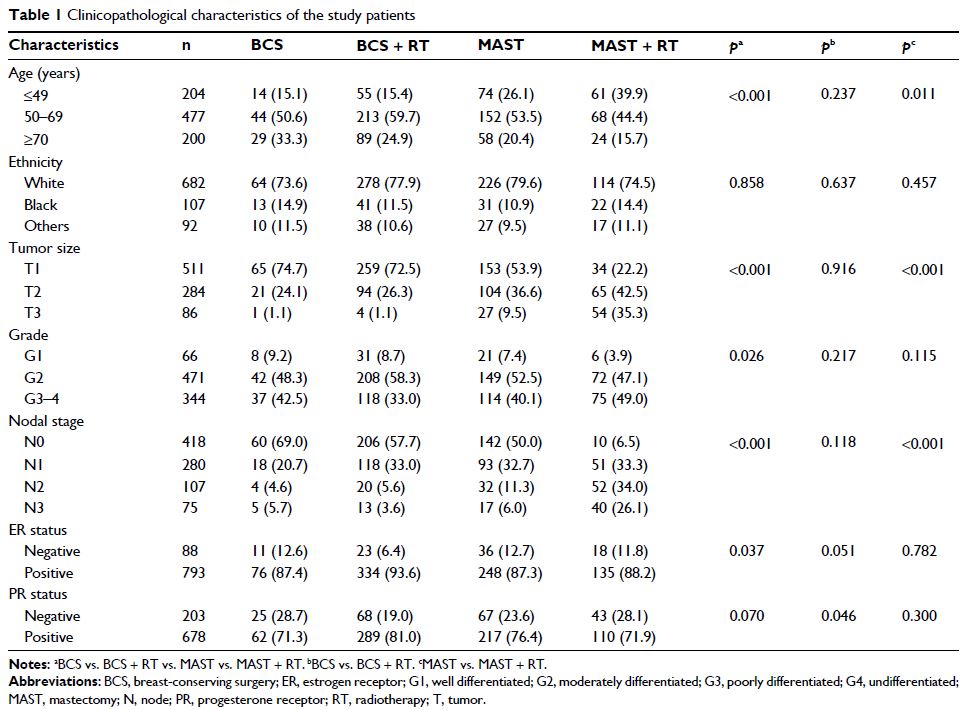108985
论文已发表
注册即可获取德孚的最新动态
IF 收录期刊
- 3.4 Breast Cancer (Dove Med Press)
- 3.2 Clin Epidemiol
- 2.6 Cancer Manag Res
- 2.9 Infect Drug Resist
- 3.7 Clin Interv Aging
- 5.1 Drug Des Dev Ther
- 3.1 Int J Chronic Obstr
- 6.6 Int J Nanomed
- 2.6 Int J Women's Health
- 2.9 Neuropsych Dis Treat
- 2.8 OncoTargets Ther
- 2.0 Patient Prefer Adher
- 2.2 Ther Clin Risk Manag
- 2.5 J Pain Res
- 3.0 Diabet Metab Synd Ob
- 3.2 Psychol Res Behav Ma
- 3.4 Nat Sci Sleep
- 1.8 Pharmgenomics Pers Med
- 2.0 Risk Manag Healthc Policy
- 4.1 J Inflamm Res
- 2.0 Int J Gen Med
- 3.4 J Hepatocell Carcinoma
- 3.0 J Asthma Allergy
- 2.2 Clin Cosmet Investig Dermatol
- 2.4 J Multidiscip Healthc

乳腺浸润性微乳头状癌术后放疗:监测、流行病学分析和最终结果数据库
Authors Wu SG, Zhang WW, Sun JY, Li FY, Chen YX, He ZY
Received 8 May 2017
Accepted for publication 22 August 2017
Published 3 October 2017 Volume 2017:9 Pages 453—459
DOI https://doi.org/10.2147/CMAR.S141338
Checked for plagiarism Yes
Review by Single-blind
Peer reviewers approved by Dr Amy Norman
Peer reviewer comments 2
Editor who approved publication: Dr Antonella D'Anneo
Introduction: Invasive micropapillary carcinoma (IMPC) of the breast poses a high risk
of locoregional recurrence, and postoperative radiotherapy (PORT) may be
beneficial in IMPC. Hence, we determined the clinical value of PORT in IMPC
patients.
Patients and methods: We assessed clinicopathological factors extracted from
the Surveillance, Epidemiology, and End Results database (2004–2013).
Univariate and multivariate Cox proportional hazards regressions were performed
to assess the independent prognostic factors on breast cancer-specific survival
(BCSS) and overall survival (OS).
Results: Of the 881 study patients, 444 (50.4%) and 437
(49.6%) underwent breast-conserving surgery (BCS) and mastectomy (MAST),
respectively, of whom 357 (80.4%) and 153 (35.0%) underwent PORT, respectively.
Patients with young age, large tumor size, or advanced nodal stage were more
likely to undergo MAST and PORT compared with MAST alone. Patients with
progesterone receptor-positive disease were more likely to receive BCS and PORT
compared with BCS alone. The 5-year BCSS and OS were 95.7% and 90.9%,
respectively. On multivariate analyses, tumor size, histological grade, and
estrogen receptor status were independent predictors of BCSS and OS. The types
of surgical procedures (MAST vs. BCS) were not an independent predictor of
survival outcomes. Patients who underwent MAST with or without PORT had similar
BCSS and OS in the multivariate analyses. Those who underwent BCS plus PORT did
not have better BCSS and OS than those who underwent BCS alone. In the low-,
intermediate-, and high-risk groups, PORT was not associated with better BCSS
and OS than non-PORT groups in patients who received BCS or MAST.
Conclusion: IMPC has favorable BCSS and OS. Regardless of the types
of surgical procedures (MAST or BCS), PORT groups were not inferior to non-PORT
groups on BCSS and OS.
Keywords: invasive
micropapillary carcinoma, SEER, radiotherapy, survival
